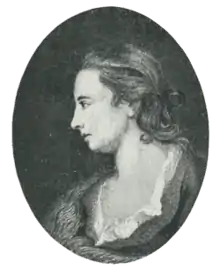Letitia Bushe
Letitia Bushe (c.1705/1710 – 17 November 1757) was an Irish watercolourist and miniaturist.[1]
Letitia Bushe | |
|---|---|
 Miniature of Bushe by Joseph Browne | |
| Born | c. 1705 – c. 1710 Dangan, County Kilkenny, Ireland |
| Died | 17 November 1757 (aged 47/52) |
| Resting place | St Andrew's church, Dublin |
| Nationality | Irish |
| Parent(s) | Arthur and Mary Bushe |
Life
Letitia Bushe was born around 1705 or 1710 in Dangan, County Kilkenny.[1][2] She was the daughter of Arthur Bushe, a secretary to the commissioners of revenue, and Mary (née Forth). Though Bushe is considered a talented artist there is no evidence of her receiving any training, though it is thought Bernard Lens or one of his sons may have given her lessons. She may have been largely self-taught as her style remained naive throughout her career. Bushe was continuously in demand as a lady's companion due to her conversational skills, which leading to her teach painting to many women and their children.[1] She was a friend of Mary Delany, Jonathan Swift and Anne Donnellan. She had a six-year relationship with a younger woman Lady Anne Bligh, which some have speculated to have been a romantic one.[3] When she was not acting as a companion she had rooms in Dawson Street. Bushe died on 17 November 1757 in those rooms.[1] She was buried the following day in St Andrew's church, Dublin.[4]
Friendship with Mary Delany
Bushe was a friend of Mary Delany from 1731.[3] She stayed with Delany on numerous occasions, and a miniature of Bushe by Joseph Browne is included in the 1861 Correspondence of Mrs Delany edited by Lady Llanover.[4] Much of what is known about Bushe's life is from the letters between her and Delany.[1] Details included was the fact that Bushe contracted smallpox which marred her good looks, and her poverty after her father's death is the reason she believed she did not receive any offers of marriage.[5] Bush and Delany remained very good friends, with Delany referring to Bushe drawing landscapes, and cleaning painting at Delany's home Delville House. Bushe and Delany embarked on a number of artist projects together.[1] Delany described Bushe as "a gay, good-humoured, innocent girl, without the least conceit of her beauty .... she paints delightfully"[4] and Delany painted Bushe herself.[6]
Artistic work
One of Bushe's pieces which is in the National Gallery of Ireland, A view of Bray (1736), shows her skill as a topographical artist and her humour, as she includes herself in the painting with an accompanying dog. During a visit to England in 1743, she painted a View of London which is taken from Hampstead Heath, as well as views of Bath and Bristol. In Ireland, Bushe painted studies of country houses, including their gardens. She also made antiquarian drawings for Bishop Robert Clayton, a friend of Delany.[1]
References
- Devine, Ruth (2009). "Bushe, Letitia". In McGuire, James; Quinn, James (eds.). Dictionary of Irish Biography. Cambridge: Cambridge University Press.
- Campbell, Kenneth L. (2013). Ireland's History: Prehistory to the Present. London: Bloomsbury Academic. p. 145. ISBN 9781472567826.
- Connolly, S. J. (2000). "A Woman's Life in Mid-Eighteenth-Century Ireland: The Case of Letitia Bushe". The Historical Journal. 43 (2): 433–451. JSTOR 3021036.
- "BUSHE, LETITIA". Library Ireland. Retrieved 27 June 2015.
- Peacock, Molly (2011). The Paper Garden: An Artist Begins Her Life's Work at 72. New York: Bloomsbury USA. ISBN 9781608196982.
- Gray, Sara (2009). The Dictionary of British Women Artists. Cambridge: The Lutterworth Press. p. 123. ISBN 9780718830847.